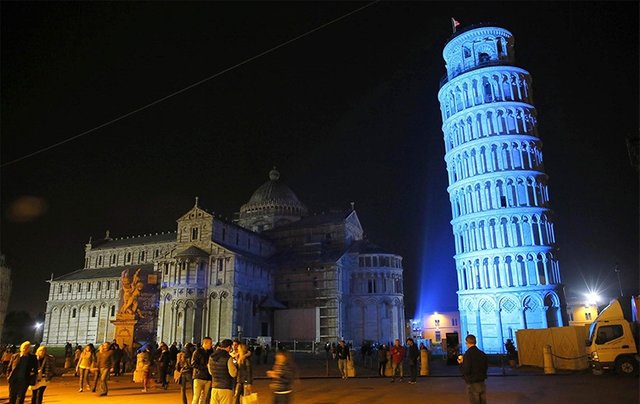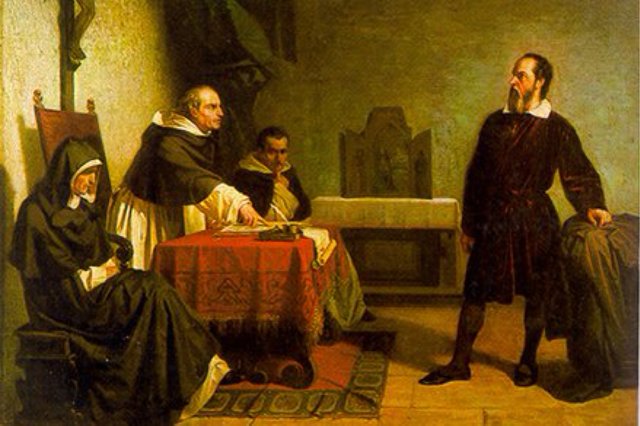Aristotle falls
While there, Galileo’s ongoing astronomical studies increasingly demonstrated that Aristotle had been wrong on numerous points. Aristotle believed the world was impure and changeable, whereas the heavens were perfect and unchanging. Galileo’s telescopic observations revealed many aspects of celestial change, and different patterns of planetary and lunar orbits. Through these observations, he became convinced that Copernicus (1473–1543) had been right: the earth orbits the sun, not the other way around.
Galileo’s timing, however, was unfortunate. Rome was turning hostile to Copernicus’s theories, and in 1615 declared them heretical. Galileo was accordingly warned by the Inquisition not to promote Copernican theories. He followed the edict for a while, but found ways to nevertheless continue researching and discussing the topic.
Enter the telescope
While there, Galileo’s ongoing astronomical studies increasingly demonstrated that Aristotle had been wrong on numerous points. Aristotle believed the world was impure and changeable, whereas the heavens were perfect and unchanging. Galileo’s telescopic observations revealed many aspects of celestial change, and different patterns of planetary and lunar orbits. Through these observations, he became convinced that Copernicus (1473–1543) had been right: the earth orbits the sun, not the other way around.
Galileo’s timing, however, was unfortunate. Rome was turning hostile to Copernicus’s theories, and in 1615 declared them heretical. Galileo was accordingly warned by the Inquisition not to promote Copernican theories. He followed the edict for a while, but found ways to nevertheless continue researching and discussing the topic.
In 1623, one of his patrons, Cardinal Maffeo Barberini, became Pope Urban VIII. After a number of interviews, Urban asked Galileo to write about the universe, but cautioned him only to deal with Copernican ideas in a hypothetical way. In 1630 the work was ready: Dialogo sopra i due massimi sistemi del mondo, tolemaico e copernicano (Dialogue on the Two Chief World Systems, Ptolemaic and Copernican), Galileo had heeded the pope’s warning, and the book carried a preface explicitly noting that it was all hypothetical. An outbreak of plague meant that he sent it to the censors in Florence rather than Rome. They approved the work, and it was published in 1632.

The Leaning Tower of Pisa - one of his earlier experiments
The final straw
The contents of the book were structured around a conversation between three characters: Salviati, who was really Galileo; Simplicio, who represented the old Aristotelian thinking; and Sagredo, who was a bright lay person. Despite Galileo’s careful preface, the book immediately caused a storm, because Galileo gave Simplicio — whom the others poked fun at throughout — the final line, and it was one the pope often said: that God, who could have created the universe any way he wanted, nevertheless made it the way we see it.
Urban immediately convoked a commission to investigate the book. It concluded that Galileo had not really dealt with Copernican theories hypothetically. They passed the file over to the Inquisition.
Galileo appeared before the Inquisition in Rome on 12 April 1633, and was questioned on the 1616 edict stating that he was forbidden to promote the Copernican theory. He submitted a letter he had kept from Cardinal Bellamine, which clarified that the restriction was only that he may not hold or defend the theory. This brought matters to an impasse. Eventually, Galileo noted that he had probably overstated the mark. On 22 June 1633 the Inquisition declared him to be vehemently suspect of heresy. He formally abjured, and was sentenced to life imprisonment, which was commuted to house arrest. The story that he whispered, “Eppur si muove” (And yet it moves) is apocryphal.
During his trial he had stayed with the Tuscan ambassador, and he had not been imprisoned or tortured. After the trial he was not formally confined, but stayed first at the Archbishop of Siena’s palace, before moving to a villa in the hills above Florence. He was now 70, and lived there, working and publishing, until his death nine years later, on 8 January 1642.

This is one of the reason why I don't fully trust the Catholic church even if I'm a Catholic myself.
If you have studied its history, you will see how easily the church flips on its ideals once the masses starts to disagree with them especially on commerce and science.
Heck! At one point in time the pope even approved of slavery and stated that even if the African slaves where human, they are less equal to the rest.
Downvoting a post can decrease pending rewards and make it less visible. Common reasons:
Submit
I am in full agreement with you there @saithe - Galileo is definitely someone who would've done well in the #science tag on Steemit.
Downvoting a post can decrease pending rewards and make it less visible. Common reasons:
Submit
Had to upvote your post and follow your smart blog! Glad to have found it!
Happy Thursday!
Downvoting a post can decrease pending rewards and make it less visible. Common reasons:
Submit
Always happy for a new follower @artedellavita - thank you.
Downvoting a post can decrease pending rewards and make it less visible. Common reasons:
Submit
Pleasure is mine :)
Downvoting a post can decrease pending rewards and make it less visible. Common reasons:
Submit
Downvoting a post can decrease pending rewards and make it less visible. Common reasons:
Submit
Impressive quote @fproductions ;)
Downvoting a post can decrease pending rewards and make it less visible. Common reasons:
Submit
Top drawer science from one of Steemit's best writers.
Downvoting a post can decrease pending rewards and make it less visible. Common reasons:
Submit
Keep it classy my friend ;)
Downvoting a post can decrease pending rewards and make it less visible. Common reasons:
Submit
long life to free thinkers :D
Downvoting a post can decrease pending rewards and make it less visible. Common reasons:
Submit
I was waiting for the other Italian to arrive - your here now :) I did this of you and Pisa whilst writing this post Ale.
Downvoting a post can decrease pending rewards and make it less visible. Common reasons:
Submit
I know you love Azzurra, and I can blame you :D
Downvoting a post can decrease pending rewards and make it less visible. Common reasons:
Submit
99.99% of Steemit does too :)
Downvoting a post can decrease pending rewards and make it less visible. Common reasons:
Submit
Thanks for sharing
Still wait for Daily Dose
Downvoting a post can decrease pending rewards and make it less visible. Common reasons:
Submit
https://steemit.com/steemit/@mindhunter/the-steemit-daily-dose-hard-fork-day-3-congratulations-to-barry-dutton-for-winning-josephs-steemfest2-competition-plus-agrello--1498119497-4022634
Downvoting a post can decrease pending rewards and make it less visible. Common reasons:
Submit
I saw this one and I upvoted it
i undersood that you will do another one and still wait
I will sleep again.. see u tomorrow.. good night
by the way your brother now Have 700 followers
https://steemit.com/milestone/@lordoftruth/700-followers-full-steem-ahead-a-huge-thank-you
Downvoting a post can decrease pending rewards and make it less visible. Common reasons:
Submit
Good thing we don't do that today... in "modern" science.
You are no longer imprisoned in your own home,
You are just not allowed in the halls of science.
You are black balled, deplatformed, called crazy and sometimes even killed.
Downvoting a post can decrease pending rewards and make it less visible. Common reasons:
Submit
Yeah, now its been replaced with centralization! Decentralized open science is what we need now on the blockchain. Innovation is completely stifled by modern day funding issues.
Downvoting a post can decrease pending rewards and make it less visible. Common reasons:
Submit
Ah, Galileo Galilei!!!! One of my heroes! Great post!
Downvoting a post can decrease pending rewards and make it less visible. Common reasons:
Submit
I kinda thought you might pass by old guy - you and @drago1812996 - I was right on both counts :)
Downvoting a post can decrease pending rewards and make it less visible. Common reasons:
Submit
Indeed I did. It inspired me to do a take. I tagged you and linked this fine post as well :)
Downvoting a post can decrease pending rewards and make it less visible. Common reasons:
Submit
Off I go for a looko old guy!
Downvoting a post can decrease pending rewards and make it less visible. Common reasons:
Submit